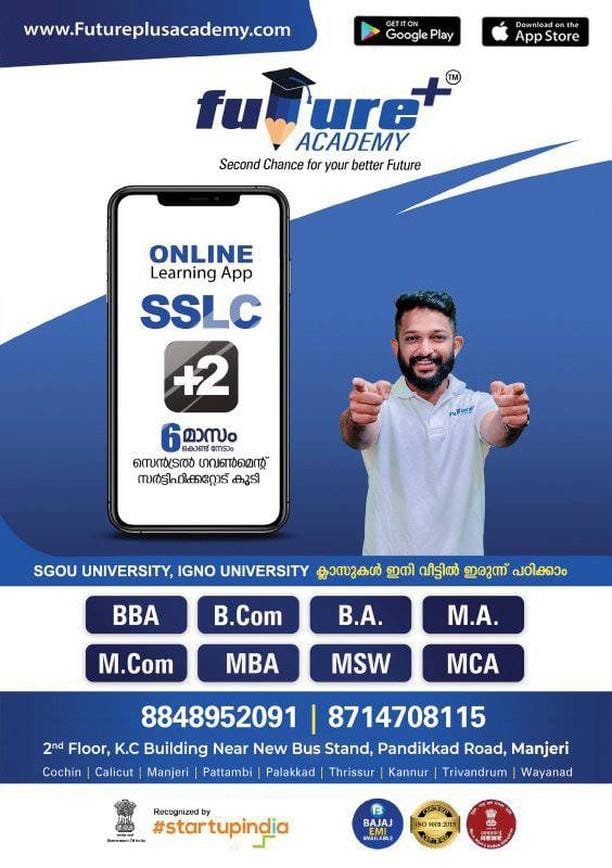Tuition for SSLC Failed Students in Malappuram
Distance Education in Changuvetty
10th Online Classes in Malappuram
Distance Education in Valanchery
Online MBA Distance Education Centers in Edappal
UPSC Approved Courses in Malappuram
Six month SSLC Plustwo Malappuram
SSLC in 6 Months in Malappuram
Ignou Distance Degree in Malappuram
MBA Distance Education Centers in Malappuram
BBA Distance Education Centers in Edappal
Ignou Online Classes in Malappuram
Degree in Six Months in Malappuram
Nios 10th Education Centers in Malappuram
BBA Distance Education Centers in Malappuram
Distance Degree Courses in Valanchery
MCom Distance Education Centers in Edappal
NIOS Centers in Changaramkulam
Sreenarayana Guru Open University in Malappuram
Distance Degree Courses in Ponnani
Distance Degree Courses in Edappal
Tuition for Degree Failed Students in Malappuram
SSLC in Six Months in Malappuram
Ignou University Courses in Malappuram
BCA Distance Education Centers in Malappuram
Distance Degree Courses in Changaramkulam
BCA Distance Education Centers in Edappal
Online Classes for 10th Failed Students in Malappuram
Plus Two in Six Months in Malappuram
NIOS Admission in Changaramkulam
MBA Distance Education Centers in Edappal
Distance Degree Courses in Kottakkal
BCom Distance Education Centers in Malappuram
MCom Distance Education Centers in Malappuram
MCA Distance Education Centers in Malappuram
Distance Education in Kuttippuram
Plus Two Online Classes in Malappuram
BA Distance Education Centers in Malappuram
BA Distance Education Centers in Edappal
Online MBA Distance Education Centers in Malappuram
Calicut University Courses in Malappuram
PSC Approved Courses in Malappuram
10th in Six Months in Malappuram
Online Degree Classes in Malappuram
Distance Education in Puthanathani
Distance Education in Malappuram
Online Classes for SSLC Failed Students in Malappuram
Distance Education in Changaramkulam
Distance Education in Kottakkal
Plus Two Online Classes in Edappal
Distance Degree Courses in Kuttippuram
BCom Distance Education Centers in Edappal
UGC Approved Courses in Malappuram
Tuition for 10th Failed Students in Malappuram
Distant Degree Classes in Malappuram
Online Classes for Plus Two Failed Students in Malappuram
Distance Degree Courses in Malappuram
NIOS Registration in Malappuram
MA Distance Education Centers in Malappuram
10th Online Classes in Edappal
Nios Plus Two Education Centers in Malappuram
SSLC Online Classes in Malappuram
Distance Degree Courses in Edappal
Ignou Assignments in Malappuram
MCA Distance Education Centers in Edappal
Tuition for Plus Two Failed Students in Malappuram
Distance Degree Courses in Tirur
MA Distance Education Centers in Edappal
Online Classes for Degree Failed Students in Malappuram
Montessori Institute in Malappuram
Bosse Plus Two Education Centers in Malappuram
Institutes For Distance Education in Malappuram
Montessori Teacher Training Institutes in Malappuram
Online Msc Psychology Distance Education Centers in Malappuram
Online Montessori Teacher Training in Malappuram
Six Month Plus Two Distance Education Centers in Malappuram
Montessori Online Study Center in Malappuram
Plus Two Distance Education Centers in Malappuram
Diploma in Montessori TTC Courses in Malappuram
Six Month 10th Distance Education Centers in Malappuram
Montessori Courses in Malappuram
Plus Two Open School Distance Education in Malappuram
Open Plus Two Education Centers in Malappuram
Distance Education Centers in Malappuram
Degree Distance Education Centers in Malappuram
Bosse 10th Education Centers in Malappuram
Online Plus Two Distance Education Centers in Malappuram
Online Degree Distance Education Centers in Malappuram
Online Classes for SSLC Failed Students in Manjeri
Ignou University Courses in Manjeri
SSLC Online Classes in Manjeri
Online Degree Classes in Manjeri
Online Classes for Degree Failed Students in Manjeri
Tuition for 10th Failed Students in Manjeri
Tuition for SSLC Failed Students in Manjeri
Ignou Online Degree in Malappuram
Distance Degree Courses in Manjeri
10th Online Classes in Manjeri
UPSC Approved Courses in Manjeri
Plus Two in Six Months in Manjeri
PSC Approved Courses in Manjeri
Tuition for Plus Two Failed Students in Manjeri
Online Classes for Plus Two Failed Students in Manjeri
Calicut University Courses in Manjeri
Rabindranath Tagore University Courses in Manjeri
UGC Approved Courses in Manjeri
Plus Two Online Classes in Manjeri
Tuition for Degree Failed Students in Manjeri
Online Classes for 10th Failed Students in Manjeri
Degree in Six Months in Manjeri
Distant Degree Classes in Manjeri
Pottery Manufacturers in Naduvattom
Ramco Cement Dealers in Kondotty
Clay Products Manufacturers in Naduvattom
Chilli Dryer Manufacturers in Malappuram
Birla Shakti Cement Dealers in Kondotty
Birla Cement Distributors in Kondotty
Kinar Mud Ring Works in Naduvattom
AAC Block Distributors in Malappuram
Clay Well Works in Kuttippuram
Packing Machine Manufacturers in Kerala
Coconut Dryer Manufacturers in Malappuram
Luxury Apartments for Monthly Rent in Perinthalmanna
Clay Well Manufacturers in Malappuram
Ramco Cement Wholesalers in Kondotty
Continuous Band Sealer Manufacturers in Malappuram
Customized Wedding Cakes in Malappuram
ACC Cement Dealers in Kondotty
Dalmia Cement Distributors in Kondotty
Luxury Apartments for Daily Rent in Perinthalmanna
Dalmia Cement Wholesalers in Malappuram
Ultratech AAC Block Dealers in Kondotty
Tandoori Tea Pottery Manufacturers in Naduvattom
Zuari Cement Distributors in Kondotty
Tandoori Tea Pottery Manufacturers in Kuttippuram
Clay Well Manufacturers in Kuttippuram
Customized Birthday Cakes Kondotty
Packing Machine Manufacturers in Malappuram
Customized Cakes in Malappuram
Mycem Cement Dealers in Kondotty
Ultratech AAC Block Dealers in Malappuram
Oil Maker Manufacturers in Malappuram
Coconut Dryer Manufacturers in Kerala
Customized Wedding Cakes in Kondotty
Educational Institutions Loans in Malappuram
Ultratech Cement Wholesalers in Malappuram
Open Well Ring Works in Kuttippuram
Vegetable Dehydration Machine Manufacturers in Kerala
Prime Minister’s Employment Generation Programme (PMEGP) in Malappuram
Kalimannu Kinar Ring Works in Naduvattom
Ambuja Cement Dealers in Kondotty
Bharathi Cement Dealers in Kondotty
Kalimannu Kinar Works in Naduvattom
Rabindranath Tagore University Courses in Malappuram
ACC Cement Wholesalers in Kondotty
Birla Cement Distributors in Malappuram
Clay Ring Manufacturers in Naduvattom
ACC Cement Wholesalers in Malappuram
JSW Cement Dealers in Malappuram
Service Apartments for Monthly Rent in Malappuram
Kalimannu Kinar Ring Works in Malappuram
Ultratech Cement Distributors in Malappuram
Contractor Loans in Malappuram
Luxury Apartments for Daily Rent in Malappuram
Kalimannu Kinar Works in Malappuram
Clay Products Manufacturers in Kuttippuram
Open Well Ring Works in Malappuram
Loan Against Property Providers in Malappuram
JSW Cement Dealers in Kondotty
Clay Well Manufacturers in Naduvattom
Business Loan Providers in Malappuram
Shankar Cement Dealers in Kondotty
Tata TMT Steel Bar Dealers in Malappuram
Birla Cement Dealers in Malappuram
Clay Products Manufacturers in Malappuram
Birla Shakti Cement Dealers in Malappuram
Clay Pot Manufacturers in Naduvattom
Penna Cement Distributors in Malappuram
Union Cement Dealers in Kondotty
Zuari Cement Dealers in Malappuram
Loan Service Providers in Malappuram
Bharathi Cement Dealers in Malappuram
Ambuja Cement Distributors in Malappuram
Chocolate Bar Cakes in Malappuram
Cement Distributors in Malappuram
Tata Tiscon TMT Bar Dealers in Kondotty
Penna Cement Dealers in Kondotty
Stand-Up India Loans in Malappuram
Tandoori Tea Clay Products Manufacturers in Kuttippuram
TMT Steel Bar Dealers in Kondotty
ACC Cement Distributors in Kondotty
Dalmia Cement Dealers in Malappuram
Ambuja Cement Distributors in Kondotty
Tata TMT Steel Bar Dealers in Kondotty
Priya Cement Dealers in Kondotty
Food Dryer Manufacturers in Malappuram
Kinar Mud Ring Works in Malappuram
Birla Super Cement Dealers in Malappuram
Union Cement Dealers in Malappuram
Loan Takeover and Topup Services in Malappuram
JSW TMT Bar Dealers in Malappuram
Well Ring Works in Kuttippuram
Bharathi Cement Distributors in Malappuram
Cement Wholesalers in Kondotty
Clay Ring Manufacturers in Malappuram
Jack Fruit Dehydration Machine Manufacturers in Kerala
Sales Tax and Income Tax Consultancies in Malappuram
Housing Loan Providers in Malappuram
Penna Cement Distributors in Kondotty
Luxury Apartments in Perinthalmanna
Kinar Ring Works in Kuttippuram
Luxury Apartments for Monthly Rent in Malappuram
Minar TMT Bar Dealers in Kondotty
Ramco Cement Distributors in Kondotty
Ramco Cement Dealers in Malappuram
Pottery Manufacturers in Kuttippuram
AAC Block Dealers in Malappuram
ACC Cement Dealers in Malappuram
Food Processing Machine Manufacturers in Kerala
Food Processing Machine Manufacturers in Malappuram
Dubai Cement Dealers in Kondotty
Ramco Cement Distributors in Malappuram
Mixed Fruit Cakes in Malappuram
Building Material Dealers in Kondotty
Dalmia Cement Wholesalers in Kondotty
Renacon AAC Block Dealers in Malappuram
Clay Pot Manufacturers in Kuttippuram
Zuari Cement Distributors in Malappuram
Commercial Cold Press Oil Maker Manufacturers in Malappuram
Service Apartments in Perinthalmanna
Jack Fruit Dehydration Machine Manufacturers in Malappuram
Sharjah Cement Dealers in Malappuram
Food Dryer Manufacturers in Kerala
Kinar Ring Works in Naduvattom
Life and Health Insurances in Malappuram
Sharjah Cement Dealers in Kondotty
Dehydration Machine Manufacturers in Kerala
Induction Sealer Manufacturers in Kerala
Minar TMT Bar Dealers in Malappuram
Dryer Manufacturers in Malappuram
Luxury Apartments in Malappuram
Export and Import Loans in Malappuram
Dryfruit Dehydration Machine Manufacturers in Kerala
Ultratech Cement Distributors in Kondotty
Dryfruit Dehydration Machine Manufacturers in Malappuram
Dalmia Cement Distributors in Malappuram
Building Material Dealers in Malappuram
Chocolate Bar Cakes in Kondotty
Kinar Ring Works in Malappuram
Open Well Works in Kuttippuram
Commercial Cold Press Oil Maker Manufacturers in Kerala
Birla Cement Dealers in Kondotty
Service Apartments for Daily Rent in Perinthalmanna
Master Business Associates - Malappuram
Service Apartments for Monthly Rent in Perinthalmanna
Tandoori Tea Pottery Manufacturers in Malappuram
Cement Distributors in Kondotty
Future Plus Academy Mobile App
Chettinad Cement Dealers in Malappuram
Tata Tiscon Steel Bar Dealers in Kondotty
Kalimannu Kinar Ring Works in Kuttippuram
Oil Maker Manufacturers in Kerala
Continuous Band Sealer Manufacturers in Kerala
Financial Consultants in Malappuram
Kairali TMT Bar Dealers in Malappuram
Ultratech Cement Dealers in Malappuram
Clay Ring Manufacturers in Kuttippuram
Kinar Mud Ring Works in Kuttippuram
Clay Ring Works in Kuttippuram
Renacon AAC Block Dealers in Kondotty
Tata Tiscon TMT Bar Dealers in Malappuram
Kairali TMT Bar Dealers in Kondotty
Tandoori Tea Clay Products Manufacturers in Naduvattom
JK Lakshmi Cement Dealers in Kondotty
Clay Pot Manufacturers in Malappuram
Dalmia Cement Dealers in Kondotty
Kalimannu Kinar Works in Kuttippuram
TMT Steel Bar Dealers in Malappuram
Unsecured Business Loans in Malappuram
Ambuja Cement Dealers in Malappuram
Tandoori Tea Clay Products Manufacturers in Malappuram
Ultratech Cement Wholesalers in Kondotty
Open Well Ring Works in Naduvattom
Chettinad Cement Dealers in Kondotty
ACC Cement Distributors in Malappuram
JK Lakshmi Cement Dealers in Malappuram
Mycem Cement Dealers in Malappuram
Service Apartments for Daily Rent in Malappuram
Vegetable Dehydration Machine Manufacturers in Malappuram
Leaf Dehydration Machine Manufacturers in Kerala
Leaf Dehydration Machine Manufacturers in Malappuram
Birla Super Cement Dealers in Kondotty
Bharathi Cement Distributors in Kondotty
Dehydration Machine Manufacturers in Malappuram
Ramco Cement Wholesalers in Malappuram
Penna Cement Dealers in Malappuram
Tata Tiscon Steel Bar Dealers in Malappuram
Agricultural Loans in Malappuram
Dubai Cement Dealers in Malappuram
Priya Cement Dealers in Malappuram
Bank Guarantee Services in Malappuram
Induction Sealer Manufacturers in Malappuram
Shankar Cement Dealers in Malappuram
Project Report Preparation in Malappuram
Corporate Legal Services in Malappuram
Chilli Dryer Manufacturers in Kerala
JSW TMT Bar Dealers in Kondotty
Cement Wholesalers in Malappuram
Zuari Cement Dealers in Kondotty
Pottery Manufacturers in Malappuram
Service Apartments in Malappuram
Ultratech Cement Dealers in Kondotty
Customized Birthday Cakes in Malappuram
Commercial Vehicle Loans in Malappuram
HiTop Education
Edappal - Malappuram
Products & Services:
HiTop Education, Edappal, Malappuram, Reviews, Contact number, Phone number, Address, Map, Certifica More..
HiTop Education, Edappal, Malappuram, Reviews, Contact number, Phone number, Address, Map, Certificate Courses - Distance Education in Edappal, Malappuram, Ratings, Directions, location, Official website link, Working hours, Services. Less..
Since : 2022
Right Education
Down Hill - Malappuram
Products & Services:
Right Education, Down Hill, Malappuram, Reviews, Contact number, Phone number, Address, Map, Distanc More..
Right Education, Down Hill, Malappuram, Reviews, Contact number, Phone number, Address, Map, Distance Education Institute in Down Hill, Malappuram, Ratings, Directions, location, Official website link, Working hours, Services. Less..
Since : 2018
Future Plus Academy
Manjeri - Malappuram
Products & Services:
Future Plus Academy , Manjeri, Malappuram, Reviews, Contact number, Phone number, Address, Map, Cert More..
Future Plus Academy , Manjeri, Malappuram, Reviews, Contact number, Phone number, Address, Map, Certificate Courses - Distance Education in Manjeri, Malappuram, Ratings, Directions, location, Official website link, Working hours, Services. Less..
Since : 2021
Master Business Associates - Malappuram
Malappuram - Malappuram
Products & Services:
Master Business Associates - Malappuram, Reviews, Contact number, Phone number, Address, Map, Best B More..
Master Business Associates - Malappuram, Reviews, Contact number, Phone number, Address, Map, Best Business Associates in Malappuram, Ratings, Directions, location, Official website link, Working hours, Services. Less..
Since :














